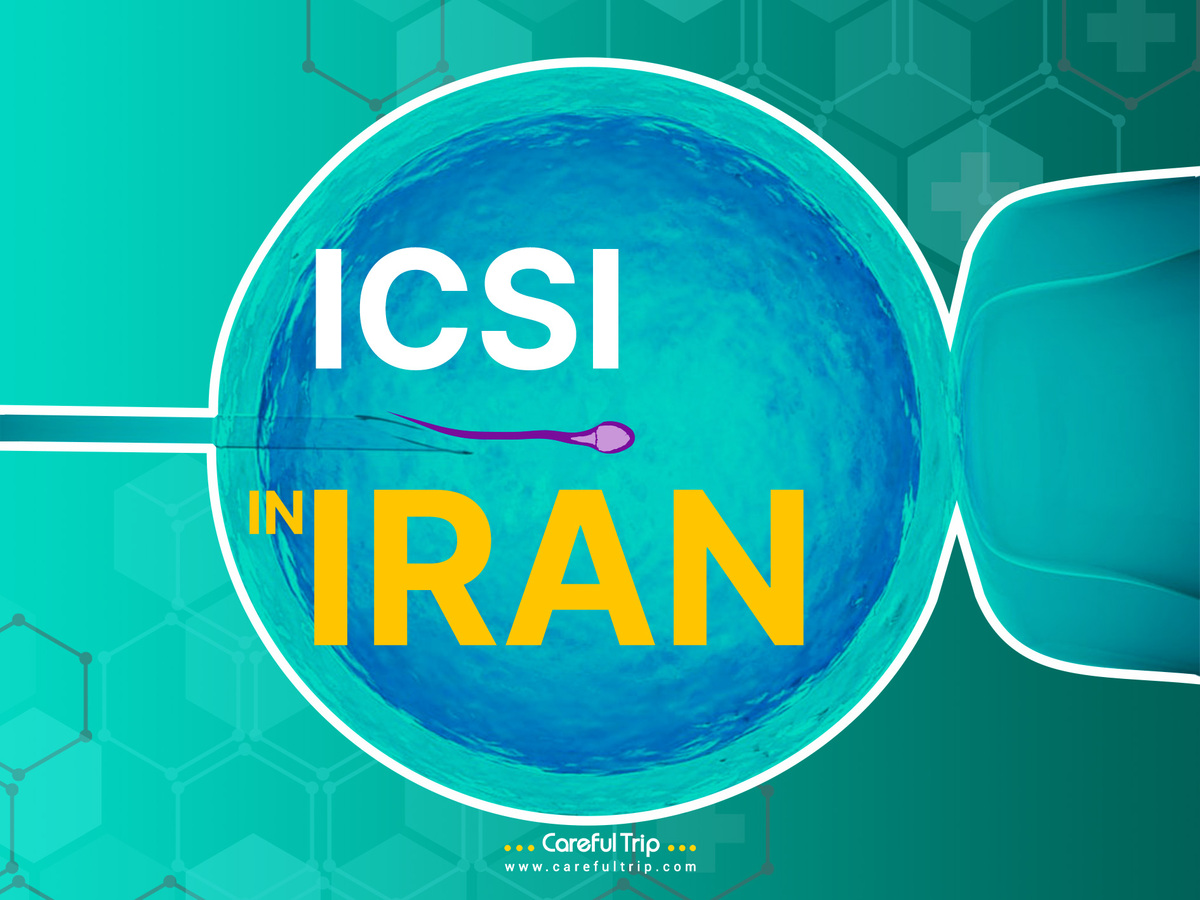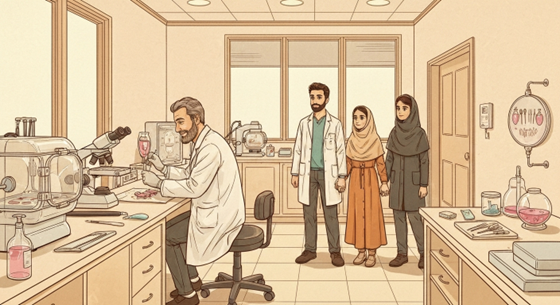
ICSI in Iran
In vitro fertilization (IVF) has revolutionized reproductive medicine, offering hope to countless couples facing infertility. Among its advanced techniques, Intracytoplasmic Sperm Injection (ICSI method) stands out, particularly in Iran, where it has seen significant advancements. ICSI, a specialized form of IVF, involves the direct injection of a single sperm into an egg, enhancing fertilization chances for couples with severe male infertility or previous IVF failures. Iran, known for its strides in medical sciences, has embraced ICSI, adapting it with cutting-edge technologies and expert medical practices.
This article delves into the ICSI in Iran, detailing each step, from pre-treatment consultations to post-transfer care. By highlighting the expertise of Iranian specialists, particularly at the MOM Infertility Treatment Center in collaboration with CarefulTrip, we aim to provide a comprehensive understanding of this life-changing IVF in Iran.
Understanding ICSI: An Overview

Intracytoplasmic Sperm Injection (ICSI) is a groundbreaking advancement in assisted reproductive technology. Specifically designed to overcome severe male infertility, ICSI involves the direct injection of a single sperm cell into an egg, bypassing natural fertilization barriers. This technique is particularly significant in Iran, where medical experts have adopted and refined it, integrating it seamlessly into the broader IVF process. The importance of ICSI lies in its ability to transform the dreams of parenthood into reality for couples who previously faced insurmountable fertility challenges. By focusing on this specialized technique, Iranian fertility clinics offer ICSI in Iran to those who have struggled with conventional fertility treatments, ensuring a higher likelihood of success and the joy of starting a family.
For more information, read:
ICSI: How Intracytoplasmic Sperm Injection Can Help Couples Conceive
ICSI in Iran: A Step-by-Step Guide
Pre-Treatment Consultation and Evaluation

The journey of ICSI in Iran begins with a thorough pre-treatment consultation. Specialists at leading centers like MOM Infertility Treatment Center engage with patients to understand their medical history, infertility challenges, and treatment expectations. This initial stage involves comprehensive diagnostic tests for both partners, including hormonal assessments and semen analysis to assess for healthy sperm. The aim is to develop a tailored treatment plan, considering the unique needs of each couple. This patient-centric approach, enhanced by the expertise of Iranian medical professionals and the support of agencies like CarefulTrip, ensures that every step towards ICSI is taken with precision and care, laying a strong foundation for the treatment’s success. Major fertility clinics and agencies in Iran, such as MOM Infertility Treatment Center and CarefulTrip, frequently offer fertility treatment packages specifically designed for ICSI. These packages typically include all necessary consultations, diagnostic tests, and procedures related to ICSI, making the process transparent and more convenient for international patients.
Ovarian Stimulation and Monitoring
Following the initial consultation, the woman undergoes ovarian stimulation. In Iran’s top-notch fertility clinics, this process is meticulously managed using the latest hormonal therapies, including human chorionic gonadotropin (HCG), to encourage the growth of multiple eggs. Regular monitoring through ultrasound and blood tests is conducted to track the development of the eggs and adjust medication doses accordingly. This phase is critical for ensuring the optimal number and quality of eggs for retrieval. Iranian specialists, known for their detailed attention and expertise, ensure that this phase is conducted with the utmost care, maximizing the chances of successful egg development.
Egg Retrieval Process
Egg retrieval is a pivotal step in the ICSI technique process in Iran. Performed under mild sedation, this procedure involves the gentle extraction of mature eggs from the ovaries using a fine needle guided by ultrasound. Iranian clinics, equipped with advanced technology and skilled professionals, ensure this process is as comfortable and efficient as possible. The retrieved eggs are then meticulously examined in the lab to select the healthiest ones for fertilization. This stage reflects the precision and excellence of Iranian medical practices in the field of assisted reproduction, ensuring the highest quality eggs are used for the ICSI procedure.
Sperm Collection and Preparation
Concurrently, sperm collection and preparation take place. In cases of male infertility, the most viable sperm are selected for ICSI, similar to conventional IVF. This may involve sperm extraction directly from the testicles in certain cases. Iranian clinics excel in these procedures, offering advanced techniques for sperm retrieval and preparation. The selected sperm are then prepared in a laboratory setting, ensuring they are in the optimal condition for injection into the eggs. This meticulous process, a testament to the expertise of Iranian fertility specialists, is crucial for enhancing the chances of successful fertilization during the ICSI procedure.
Micromanipulation and Fertilization
The heart of the ICSI procedure in Iran is the micromanipulation and fertilization stage. Under a microscope, a single sperm is carefully injected into each egg. This precision-driven process requires exceptional skill and advanced equipment, both of which are hallmarks of Iranian fertility clinics. This stage is crucial as it bypasses natural barriers to fertilization, especially in cases of severe male infertility and also complements other methods such as intrauterine insemination (IUI). The expertise of Iranian embryologists plays a pivotal role here, ensuring the highest possible fertilization rates. This meticulous approach to micromanipulation is a prime example of Iran’s commitment to providing cutting-edge fertility treatments.
Embryo Culture and Development
Post-fertilization, the embryos are cultured in the lab for several days to allow them to develop. During this period, Iranian fertility clinics utilized advanced incubation techniques to create the ideal environment for embryo growth. This phase is critical as it determines the quality and viability of the embryos for implantation. Maintaining a healthy diet during this time can further enhance the chances of success. The embryologists closely monitor the development, selecting the best embryos for transfer. This stage showcases the advanced technological capabilities of Iran’s fertility clinics, ensuring that only the healthiest and most viable embryos are chosen for the next step.
Embryo Transfer
Embryo transfer is a significant and hopeful stage in the ICSI process. In this step, one or more of the best-developed embryos created from motile sperm are carefully transferred into the woman’s uterus. This procedure is performed with great precision and care in Iranian clinics, often using ultrasound guidance to ensure optimal placement. The expertise of Iranian specialists is evident in their gentle and precise approach, maximizing the chances of implantation and pregnancy. The transfer is a moment filled with anticipation and hope for couples undergoing ICSI in Iran, marking a pivotal step toward achieving their dream of parenthood.
Post-Transfer Care and Pregnancy Test
After the embryo transfer, patients receive post-transfer care instructions and support. This includes advice on medications, lifestyle adjustments, and follow-up appointments. In cases where a testicular biopsy is performed prior to the ICSI procedure, the culmination of the ICSI process in Iran is the pregnancy test, typically conducted two weeks after the embryo transfer. The anticipation and excitement of this moment are shared by both the medical team and the aspiring parents. Positive results bring immense joy and are a testament to the expertise and dedication of the medical professionals in Iran, particularly those at the MOM Infertility Treatment Center, and the comprehensive care provided by agencies like CarefulTrip.
ICSI Success Rates in Iran
The success rates of ICSI in Iran are a crucial aspect of its appeal to couples seeking fertility treatments. These rates are competitive with global standards, showcasing the proficiency and advancement of Iranian reproductive medicine. Success in ICSI depends on various factors, including the maternal age of the patient, the cause of infertility, and the quality of the sperm and eggs. Iranian clinics, known for their comprehensive approach and state-of-the-art technology, consistently report high success rates. This success is attributed not only to the medical expertise available but also to the individualized care and advanced techniques employed in Iranian fertility centers. The high success rates reinforce Iran’s position as a leading destination for couples seeking effective ICSI treatment, offering hope and a high likelihood of achieving pregnancy.
Challenges and Solutions in ICSI Treatment in Iran
While ICSI in Iran offers groundbreaking solutions in fertility treatment, it also presents unique challenges. In Iran, these challenges are met with innovative solutions and continuous improvement in medical practices. One of the primary challenges is ensuring the highest quality of egg and sperm for the procedure, particularly in the cytoplasm of an egg. Iranian clinics address this through advanced screening and preparation techniques. Another challenge is the emotional and psychological stress associated with infertility treatments. Iranian healthcare providers, understanding this aspect, offer comprehensive support and counseling services to help couples navigate the emotional journey of fertility treatments. Furthermore, the integration of new technologies and research into practice ensures that Iranian ICSI treatments remain at the forefront of reproductive medicine, continually overcoming challenges and improving success rates.
Cost of ICSI Treatment in Iran
The cost of ICSI treatment in Iran is notably more affordable compared to many Western countries, making it an attractive option for couples seeking fertility solutions. On average, the cost of ICSI in Iran ranges from $3,000 to $3,500, which is a stark contrast to the prices in the United States, where the cost of IVF can reach up to $20,000 per cycle. Factors influencing the cost include the clinic’s reputation, the complexity of the case, and any additional services required, such as medication or travel expenses. Despite these variables, many international patients find that the combination of high-quality care and affordable prices positions Iran as a top destination for ICSI treatments. As a result, couples can access advanced reproductive technologies without the financial burden often encountered in their home countries.
Who Is a Good Candidate for ICSI?
Determining eligibility for ICSI treatment involves understanding the underlying causes of infertility. Couples facing male infertility issues, such as poor sperm quality, low sperm count, or previous IVF failures, are often prime candidates for ICSI. Additionally, individuals with conditions like obstructive azoospermia, where sperm cannot be naturally ejaculated, may require testicular sperm extraction; this is particularly important when there is an absence of sperm in the semen sample, making ICSI a suitable option. Women with low ovarian reserve or those who have experienced unsuccessful fertilization in past IVF cycles could also benefit significantly from this specialized treatment. Overall, ICSI is tailored for couples looking to overcome specific fertility challenges, enhancing their chances of conception.
Risks and Side Effects of ICSI Treatment
While ICSI is considered safe and effective, there are some risks and side effects associated with the procedure that couples should be aware of. One of the primary concerns includes the potential for birth defects and the risk of additional complications, with studies indicating a slightly higher incidence compared to natural conception. This is an important consideration, especially for couples who may be at higher risk for genetic disorders. Additionally, there may be emotional and psychological impacts stemming from the stress of treatment and the uncertainty surrounding outcomes. However, with proper guidance and support from fertility specialists in Iran, couples can navigate these risks effectively and make informed decisions regarding their reproductive health.
Patient Experiences and Testimonials
Patient experiences and testimonials offer valuable insights into the effectiveness and impact of IVF treatment and ICSI treatments in Iran. These personal stories often highlight the professionalism, empathy, and expertise of Iranian fertility specialists and the supportive environment of clinics like MOM Infertility Treatment Center. Many couples express gratitude for the personalized care and detailed attention they received throughout their IVF treatment journey. Testimonials frequently mention the advanced technology and innovative techniques used, contributing to successful outcomes. These personal accounts reinforce the reputation of Iran as a hub for fertility treatments, where patients from around the world find hope and success in their journey to parenthood. The positive experiences shared by patients underscore the commitment of Iranian medical professionals to providing exceptional care in the field of assisted reproduction.
The Role of MOM Infertility Treatment Center and CarefulTrip
The MOM Infertility Treatment Center, in association with CarefulTrip, plays a pivotal role in providing ICSI treatments in Iran, particularly for couples facing issues like poor sperm quality. These institutions exemplify the high standards of care and advanced technology that characterize Iranian reproductive medicine. The MOM Center, staffed with some of the best doctors and specialists in the field, offers a comprehensive range of fertility services, including the latest methods of IVF and ICSI. CarefulTrip, as a health tourism agency, facilitates the journey for international patients, providing logistical support and ensuring a seamless experience. Their collaboration enhances the accessibility and quality of fertility treatments in Iran, making it a preferred destination for couples worldwide. The success stories emerging from the collaboration between the MOM Center and CarefulTrip are a testament to their dedication and expertise in helping couples achieve their dream of parenthood.
Conclusion and Future Perspectives
In conclusion, ICSI in Iran stands as a testament to the country’s advancements in reproductive medicine. The comprehensive step-by-step approach, high success rates, and patient-centered care exemplify the dedication to excellence in fertility treatments, including the success rate of IVF. The challenges inherent in ICSI are adeptly met with innovative solutions and continuous improvements, making Iran a leading destination for this advanced procedure. The collaboration between institutions like the MOM Infertility Treatment Center and CarefulTrip further strengthens Iran’s position in the global arena of fertility treatments. Looking ahead, the future of ICSI in Iran is bright, with ongoing research, technological advancements, and a commitment to providing the best possible care to couples seeking help. Iran’s role in the world of assisted reproduction is not only significant but also inspirational, offering hope and success to many aspiring parents.
FAQ
Is IVF allowed in Iran?
Yes, IVF treatments, including ICSI, are allowed and widely practiced in Iran. The country has made substantial advancements in assisted reproductive technologies, providing couples with various options for fertility treatments. Clinics in Iran offer a range of services, including sperm donation and egg donation, ensuring that patients can access comprehensive care tailored to their needs. The regulatory framework surrounding assisted reproductive technology in Iran supports ethical practices and patient safety, making it a reliable choice for those seeking IVF treatments.
What steps should I take to prepare for ICSI treatment in Iran?
Preparing for ICSI treatment in Iran involves several essential steps. Couples should consider consulting with a fertility expert to evaluate their health and discuss any necessary treatments, such as egg donor options or sperm sample collection methods. For those traveling for medical tourism, ensuring proper arrangements for their IVF procedure, including travel and accommodation, is crucial. Additionally, maintaining a healthy lifestyle and focusing on achieving optimal sperm quality can enhance the chances of success during the ICSI process.
Is ICSI in Iran safe for international patients?
ICSI treatment in Iran is regarded as safe for international patients, with clinics adhering to high standards of medical practice and patient care. The presence of experienced medical professionals and advanced technologies ensures that safety protocols are rigorously followed. Furthermore, the use of ICSI in international patients often receives comprehensive support from agencies that facilitate their treatment journey, addressing any concerns they may have about safety and effectiveness in the context of infertility treatment.
What’s the average cost of IVF treatments for foreigners in Iran versus neighboring countries?
When comparing the average costs of IVF treatments for foreigners, Iran stands out as a cost-effective option for addressing infertility issues. The average cost of ICSI in Iran is significantly lower than that in neighboring countries, with prices ranging from $3,000 to $3,500. In contrast, treatments in Turkey may range from $4,000 to $7,000, while prices in European countries can reach up to $10,000 per cycle. This affordability, combined with high-quality medical services, makes Iran a highly attractive destination for couples seeking IVF treatments.
Is Iran becoming the capital of low-cost surrogacy and IVF?
Iran is increasingly recognized for its affordable surrogacy and IVF services, attracting international patients seeking cost-effective options. The country combines advanced medical technology with lower prices, making it a competitive choice for those pursuing assisted reproductive solutions. This trend positions Iran as a key player in the global fertility market.
References:
- https://doi.org/10.1016/j.jogn.2018.12.009
- https://doi.org/10.1016/S0015-0282(99)00465-3
- https://www.ncbi.nlm.nih.gov/pubmed/27207175
- https://www.ncbi.nlm.nih.gov/pubmed/27852688
- https://www.ncbi.nlm.nih.gov/pubmed/24285681
- https://www.ncbi.nlm.nih.gov/pubmed/22981171
- https://www.ncbi.nlm.nih.gov/pubmed/24793928
- https://pubmed.ncbi.nlm.nih.gov/7623897
